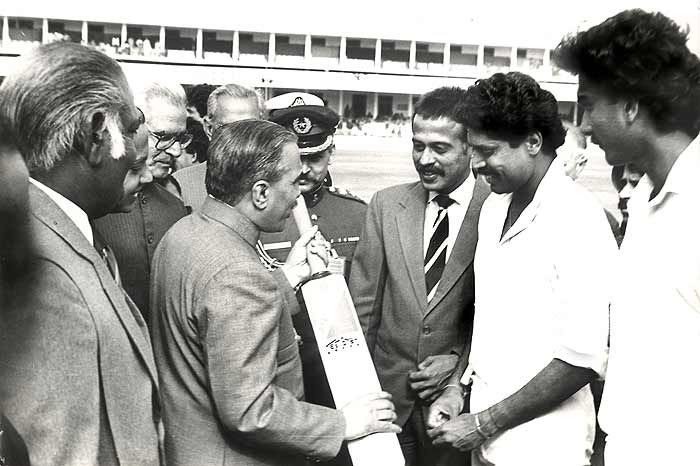
Written by: Mustafa-ur-Rehman
Posted on: October 4, 2022 |  | 中文
| 中文
Cricket in Pakistan: Nation, Identity and Politics by Dr. Ali Khan
Cricket in Pakistan: Nation, Identity and Politics by Dr Ali Khan is, as the title suggests, not a typical cricket book. It does not simply discuss the “gentleman’s game”, as cricket is often referred to, in terms of players, venues and records. Dr Ali Khan instead examines the sport and its impact on Pakistan through a cultural and anthropological lens. Dr Ali Khan is an Associate Professor of Anthropology and Dean of the Mushtaq Ahmad Gurmani School of Humanities and Social Sciences at LUMS, with a PhD in Anthropology from the University of Cambridge.
The book draws interesting parallels between Pakistan's ever-changing social and political landscape and the major changes that Pakistan cricket has undergone over the decades. The book sees “cricket in society and society in cricket.”, essentially positioning Pakistan cricket and Pakistani society as mirrors for each other. The author understands that in a broader perspective, each international cricket team is essentially a portrayal of its society. Just like the Pakistan cricket team thrives on being unpredictable and mercurial, this provides an insight into the diverse multicultural landscape of Pakistan’s social fabric at large. Similarly, the West Indies is full of flair and creativity, Australians are candid and expressive, the English are reserved and disciplined, while the Indians have gone from cautious to expressive over the years, reflecting how India has transformed over the decades.
According to the book, the dark underbelly of Pakistan cricket must also be a point of major concern. The book addresses the issue of match-fixing in Pakistan cricket in a particularly interesting manner. The author argues that instead of seeing these match-fixing incidents, particularly the 2010 match-fixing scandal, as isolated incidents, these events must be seen as a greater commentary on Pakistani society. The match-fixing in cricket reflects the deep-rooted issue of corruption across the entire country and its institutions.
The book understands that cricket has been among the most powerful unifying factors for the country. It has been a source of hope in a time of darkness multiple times during Pakistan’s turbulent history. For example, the 2009 T20 World Cup win came immediately in the aftermath of the 2009 terrorist attacks on the Sri Lanka cricket team in Lahore, when Pakistan was stripped of hosting international rights for over half a decade. The country was forced to play its cricket at neutral venues such as the UAE, until Zimbabwe visited Pakistan in 2015. The Pakistan Super League (PSL) paved the way for international cricket to return to Pakistan and has continued to promote the country’s image on foreign shores.
While many schools of thought associated with the game argue that cricket and politics must be kept as far apart as possible, the author argues the exact opposite. Arguing that the sport is politics itself, the book points to a few different events where the game has helped Pakistan on the diplomacy front, particularly in the case of Pak-India bilateral ties. One such major example of “sports diplomacy” is when Zia ul Haq travelled to India to attend a Pakistan-India cricket match to lower tensions between the two countries.

Zia-ul-Haq presenting a bat as a gift to Indian Captain Kapil Dev as part of his 'cricket diplomacy'
Over the decades, the book attempts to understand how cricket has transformed itself according to the political situation. While in the 1970s, most Pakistani players hailed from the two major cities of Karachi and Lahore. However, with the passage of time and the reach of broadcast media, especially television and radio, which increased exponentially across the country, a wave of players began emerging from different parts of the country as well.
The book also attempts to unpack the colonial legacy of cricket, as well as the eventual decolonisation that has followed in recent decades. Even though the gentleman’s game was invented and popularised in England, cricket has become a truly global sport today. As the game attempts to detach itself from its colonial past, a number of measures, such as renaming the global governing body from Imperial Cricket Council to International Cricket Council (ICC) have been taken.
Similarly, class and social structure have impacted cricket in Pakistan, transforming it from an aristocratic activity in the Pre-Partition era to a uniquely middle-class concern by the 1970s and 1980s. However, Pakistan has struggled to shake its ‘unpredictable’ tag since players in Pakistan are not provided with the proper professional facilities, and there is a lack of emphasis on discipline. Many overnight success stories of Pakistan cricket are essentially players who have emerged out of remote areas of the country and have not been groomed and developed to cope with the rigors and demands of the international game.
To conclude, Cricket in Pakistan: Nation, Identity and Politics by Dr Ali Khan provides an incredibly detailed analysis of Pakistan cricket as a social, cultural and anthropological phenomenon. It is a must-read for anyone looking to develop a critical understanding of Pakistan cricket and its undeniable connection with the politics of the country.
You may also like: